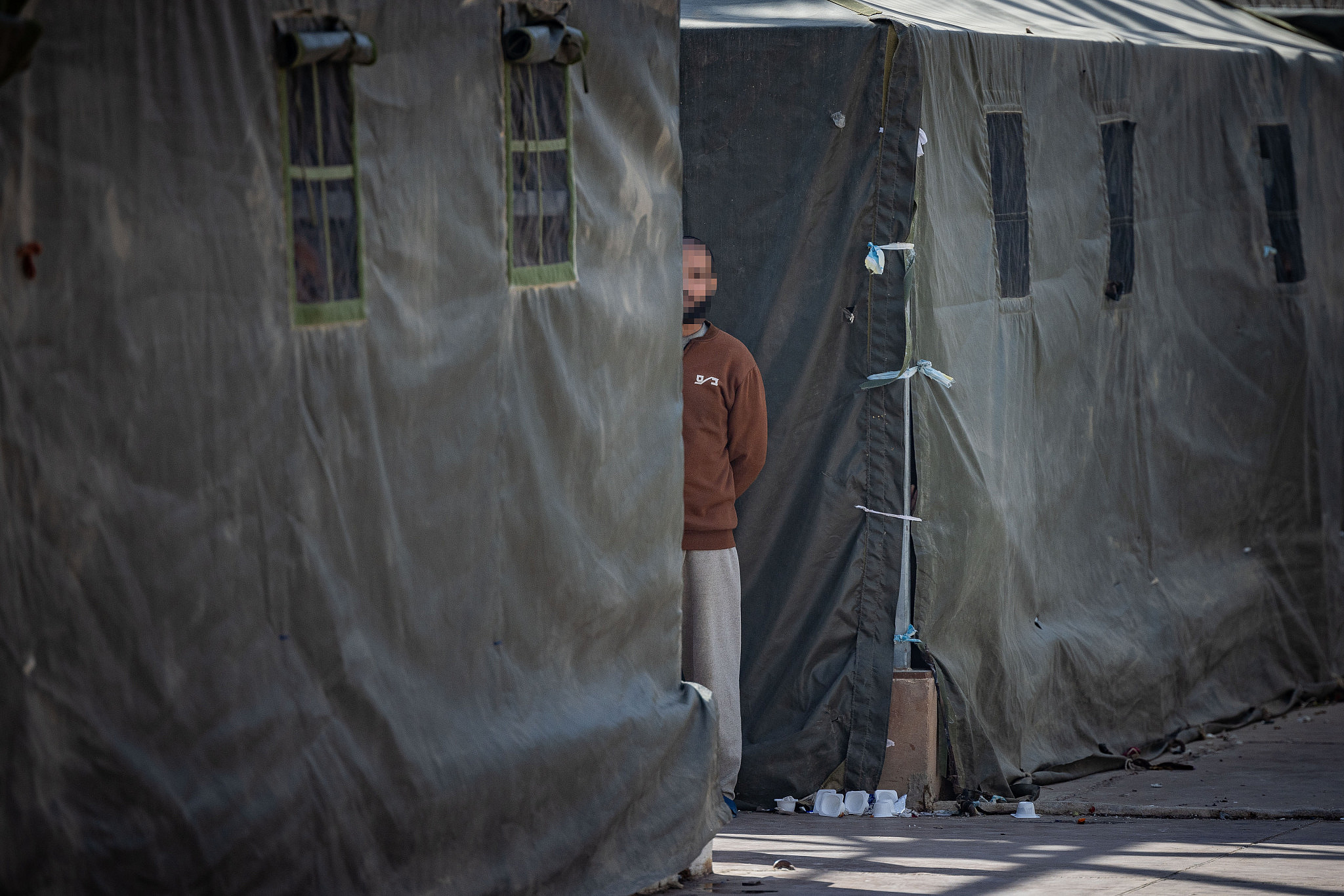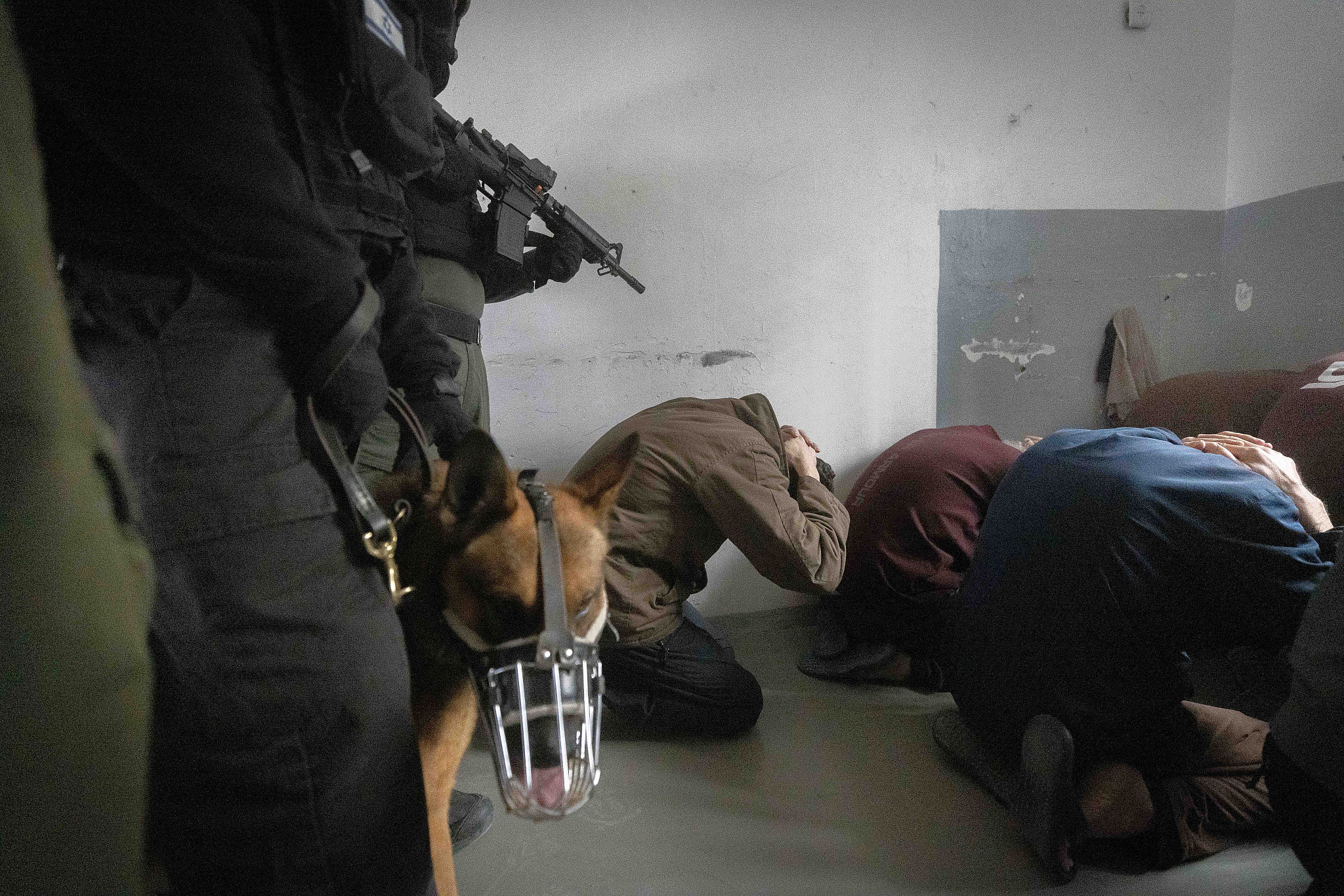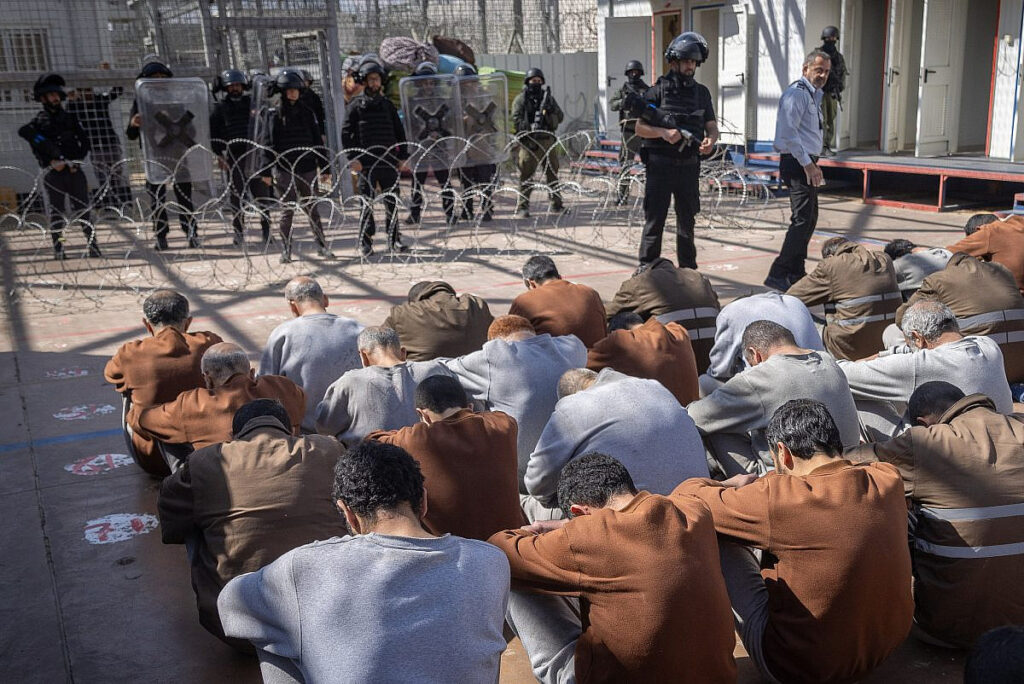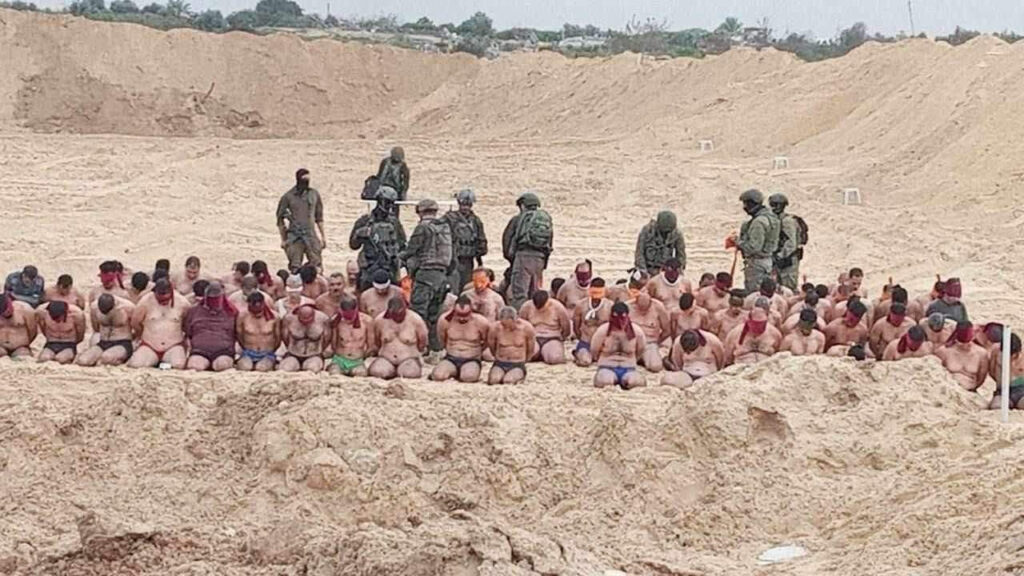After the shocking images were exposed, Israeli officials admitted that approximately 90 percent of the detainees were civilians unaffiliated with any militant groups.
In January, +972 and Local Call spoke with several of these former detainees, and collated public testimonies from others. They described how soldiers inflicted a range of violent practices against civilians and combatants alike at the detention facilities, including forcing inmates to stand for 20 hours in a row and beating them if they move; blindfolding and handcuffing inmates for hours on end; and preventing them from sleeping by constant exposure to lights.
Last week, CNN further revealed the testimonies of three Israeli whistleblowers who worked at Sde Teiman, affirming many of the accounts of these former detainees.
On April 4, Haaretz revealed a copy of a letter written by a doctor working in the field hospital at Sde Teiman. Addressed to the Israeli Defense Minister, Health Minister, and Attorney General, the letter describes the horrific conditions and abusive practices taking place at the army base.
“Just this week,” the doctor wrote, “two prisoners had their legs amputated due to handcuff injuries, which unfortunately is a routine event.” The letter listed various methods of torture and ill-treatment deployed at the base, such as inmates being fed through straws, forced to defecate in diapers, and held with constant restraints on their hands and feet. “This makes all of us — the medical teams and you, those in charge of us in the health and defense ministries — complicit in the violation of Israeli law,” the doctor asserted.
“From the descriptions that emerge in the letter,” said the Public Committee Against Torture in Israel (PCATI) in response, “it is clear beyond any doubt that these are acts whose perpetrators’ concern is not investigation and accountability, but cruelty and vindictiveness for its own sake.” Physicians for Human Rights – Israel (PHRI) similarly stated that such practices “amounted to torture.”
In February, a medical ethics committee made up of representatives of the Health Ministry, Israel Medical Association, and hospital managements visited Sde Teiman, following reports from medical staff at the facility that they were encountering ethical problems. That initial visit — which had been postponed several times — took place nearly four months after a field hospital was established at the army base. Although the committee has yet to publish its findings, one source who visited the base told Haaretz, “These are the conditions of a field hospital in Iraq.”
Sde Teiman is part of a network of military sites across Israel that are operating in clear violation of international law and basic ethical standards. Yet the fact that such practices are taking place amid Israel’s ongoing war is, unfortunately, unsurprising. Indeed, the writing has always been on the wall.

Laying the legal groundwork
The Israeli government has spent months laying the legal groundwork for sites like Sde Teiman to operate with unprecedented impunity. For example, the Knesset recently passed an amendment to the “Law on the Imprisonment of Illegal Combatants,” along with other new emergency regulations, granting broad powers to detain prisoners with little oversight or due process.
In accordance with the new amendment — passed into law on Dec. 18 and active for a period of four months — a person may be detained for 45 days without a warrant, held without judicial review over their case for 75 days, and denied a meeting with an attorney for 180 days. The cumulative effect of these regulations is that a person can be tortured, and even die, without anyone knowing about their detention or the conditions and location of their imprisonment.
No less dangerous is the fact that, even after the announcement of the deaths of 27 detainees in military facilities since the start of the war (and the number may be even higher), the Israeli government has not deviated from these policies. On April 2, the Imprisonment of Illegal Combatants Bill (Amendment No. 4 and Temporary Order) passed its second and third readings on the Knesset floor. This bill extends the validity of regulations that allow security detainees to be prevented from meeting with a lawyer for up to 90 consecutive days, operating until July 31. This is in addition to many other technical procedures and restrictions that could effectively thwart a detainee’s ability to meet with a lawyer for months.
The Israeli authorities have utilized these new carceral powers quite freely. According to the IPS quarterly report, through March 2024, the IPS held 829 detainees (828 men and one woman) under the Law on the Imprisonment of Illegal Combatants; since then, the number of Gazan detainees has reportedly increased by 150 percent. Also by March, according to the IPS, the number of Palestinian detainees defined as “security prisoners” reached 9,077, including 3,582 administrative detainees, who are held without charge or trial.
Crucially, the Israeli legal code does not explicitly forbid torture. Although it signed and ratified the UN Convention Against Torture, the state has so far refrained from passing legislation defining torture as a crime and establishing a punishment for committing it. The absence of such a law is a key part of what allows torture to continue, and for perpetrators to evade accountability. It also creates a legal gray area — a gap between Israeli and international law — in which war crimes and state-sanctioned torture can be committed without any oversight.

The conditions in detention centers run by the Israel Prison Service reflect much the same spirit of abuse that prevails in military prison facilities: Palestinian detainees regularly report torture, physical and psychological violence, as well as inhumane, humiliating, and extremely cruel conditions of incarceration.
Among many documents, this was also reflected in a recent report by the Israeli Public Defender’s Office (part of the Justice Ministry), which listed a series of deficiencies in Israeli prisons since the start of the war. The report paints a grim picture of the severe and unprecedented harm that detainees and prisoners are subjected to: unbearable overcrowding, poor sanitary conditions, poor hygiene and pest problems, improper ventilation, lack of basic equipment, and more.
Itamar Ben-Gvir — who, as national security minister, oversees Israeli prisons — authorized and encouraged the IPS commissioner to treat prisoners and detainees harshly after October 7. And the prison authorities have obliged. During a visit by Ben Gvir to one detention facility in November, the Israeli national anthem, Hatikvah, was played while prisoners were handcuffed and led with their heads forced down, before they were placed under “lockdown” conditions, prohibited from leaving their cells and were restrained by their hands and feet.
In December, Ben Gvir ordered the reopening of the Rakefet wing of the Nitzan Prison in order to house Hamas prisoners. The prison wing had been closed for decades due to its inhumane conditions: it is located underground and so has no daylight, and its cells are extremely cramped. These policies are only the latest in the minister’s months-long effort, even before the war, to immiserate Palestinian prisoners.
The genuine fears about the harsh conditions in Israelis prisons, as well as the dire physical and mental wellbeing of prisoners and detainees, have clearly become a horrible truth. This dangerous situation is compounded by the lack of judicial review, the prevention of visits by Red Cross representatives, blocking access to lawyers and family visits, and thwarting any contact between the detainees and the world outside the prison walls.
As groups like PCATI have warned, “The legal arrangement under which detainees from Gaza are held turns military detention facilities into extra-territorial areas, where [detainees] are dehumanized and their lives placed in real danger.”
The world needs to know about what is happening in Israel’s prisons and detention facilities, which is a key component of the war on Gaza. It is our legal, moral, and human duty to expose these horrendous conditions of torture and abuse, and to bring about their immediate end. Otherwise, the only thing that separates Sde Teiman from Guantanamo or Abu Ghraib is physical distance.

